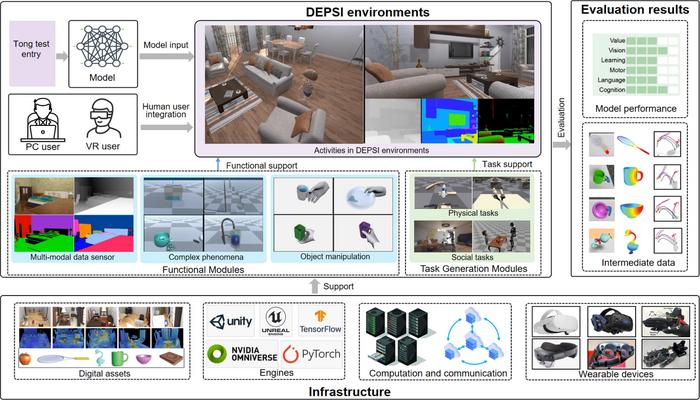We are pleased to announce a breakthrough in the evaluation of artificial general intelligence (AGI) with the introduction of the Tong test (where “Tong” corresponds to the pronunciation of the Chinese character of “general,” as in “artificial general intelligence”), as proposed by a recent perspective article published in Engineering. This innovative approach aims to provide a standardized, quantitative, and objective evaluation system for AGI by focusing on dynamic embodied physical and social interactions (DEPSI).

Credit: Yujia Peng et al.
We are pleased to announce a breakthrough in the evaluation of artificial general intelligence (AGI) with the introduction of the Tong test (where “Tong” corresponds to the pronunciation of the Chinese character of “general,” as in “artificial general intelligence”), as proposed by a recent perspective article published in Engineering. This innovative approach aims to provide a standardized, quantitative, and objective evaluation system for AGI by focusing on dynamic embodied physical and social interactions (DEPSI).
The rapid advancement of the generative pre-trained transformer (GPT) series has brought AGI to the forefront of the artificial intelligence (AI) field. However, defining and evaluating AGI remained a challenge. The Tong test offers a fresh perspective on AGI evaluation by emphasizing the importance of DEPSI as a framework.
Traditionally, AI benchmarks have been task-oriented, but the Tong test shifts the focus towards ability- and value-oriented evaluations. The virtual platform proposed in the Tong test supports embodied AI in training and testing, enabling AI agents to acquire information, learn, and fine-tune their values and abilities interactively.
The Tong test proposes five critical characteristics that can serve as AGI benchmarks: infinite tasks, self-driven task generation, value alignment, causal understanding, and embodiment. These characteristics form the basis for a systemic evaluation system that allows for the delineation of AGI milestones through a virtual environment with DEPSI.
Unlike classical AI testing systems, the Tong test provides a more comprehensive and inclusive evaluation approach. It combines a general algorithmic testing paradigm with a human–AI interaction-based testing paradigm, taking inspiration from the philosophy of the Turing test. The Tong test’s virtual platform generates unlimited tasks with dynamic embodied interaction scenarios, covering various dimensions of abilities and values.
The Tong test platform incorporates essential components such as infrastructure, DEPSI environments, and evaluation tools. This combination provides a practical pathway for building an embodied platform with infinite tasks, where AI algorithms can be evaluated onsite with human interactions.
By introducing the Tong test, this perspective article paves the way for a standardized and objective evaluation system for AGI. It offers theoretical guidance for the development of AI algorithms while emphasizing the importance of DEPSI in evaluating AGI.
The authors of the perspective article believe that the Tong test has the potential to drive the field of AGI evaluation forward by promoting standardized, quantitative, and objective benchmarks. This will not only contribute to the further development of AGI but also foster greater transparency and understanding in the AI community.
The paper “The Tong Test: Evaluating Artificial General Intelligence Through Dynamic Embodied Physical and Social Interactions” has been published in Engineering, authored by Yujia Peng, Jiaheng Han, Zhenliang Zhang, Lifeng Fan, Tengyu Liu, Siyuan Qi, Xue Feng, Yuxi Ma, Yizhou Wang, Song-Chun Zhu. Full text of the open access paper: https://doi.org/10.1016/j.eng.2023.07.006. For more information about the Engineering, follow us on Twitter (https://twitter.com/EngineeringJrnl) & Like us on Facebook (https://www.facebook.com/EngineeringPortfolio).
Journal
Engineering
DOI
10.1016/j.eng.2023.07.006
Article Title
The Tong Test: Evaluating Artificial General Intelligence Through Dynamic Embodied Physical and Social Interactions
Article Publication Date
9-Aug-2023



